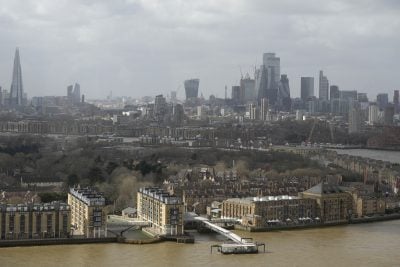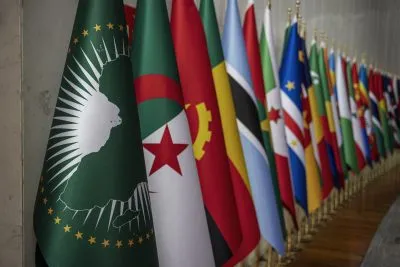Currency traders are backing Muhammadu Buhari, but the Nigerian president-elect is still keeping his economic policies close to his chest.
From his berth outside a handicraft centre on the grounds of an upmarket Abuja hotel, Umar*, a grey market currency trader, explained the day’s US dollar to naira rate of 205.
“APC is winning and will strengthen the naira,” he insisted. It was 29th March, and Umar’s rate was well below the spike of 220 in February, after Nigeria’s Independent Election Committee postponed presidential polls from 14th February to 28th March, leading to a shortage of dollars.
The centre officially sells traditional souvenirs made by local artisans, but unofficially it is a site for buying and selling the naira on the informal market. It may look ad hoc but the traders – usually older men wearing Hausa babban riga, assisted by younger men sporting the colours of Barcelona or Arsenal football clubs – often know more about the currency market than those sitting in air-conditioned bank offices in Lagos.
The naira has taken a pummelling in the past six months as the price of oil, Nigeria’s biggest export, has fallen. In October 2014, the naira officially traded at N165 to the US dollar. After that announcement of the delay to the elections, this rose to N205 and over N220 on the informal markets.
In the week before the rescheduled elections, naira shortages, caused by the enormous cash demands of election spending, began to compete with dollar shortages to move the market. The informal exchange rate eased slightly to around 210.
Umar’s 29th March price of 205 reflected confidence that the opposition party All Progressives Congress (APC) candidate Muhammadu Buhari would win the elections and would do more to strengthen the naira than incumbent Goodluck Jonathan.
He was calling the election early – around 36 hours before our sister magazine New African was the first to project a Buhari victory, and well over 48 hours before Jonathan conceded. He said that he expected the naira to strengthen further over the coming weeks to the 195-190 range, assuming the Independent National Electoral Commission (INEC) confirmed Buhari’s victory.
Three weeks on, this seems optimistic. The official naira rate has stabilised at 199 to the dollar and the informal rate is 212. However, informal traders still expect the naira to strengthen under Buhari.
US Dollar to the Naira on the official market. Courtesy of xe.com
One well-established trader Abubakar*, who African Business reached by phone on 22nd April, said, “The dollar will go down when Buhari is president”. He expected a dollar to be worth “170-something or 180-something” by September, three months after Buhari is inaugurated on 29th May. This would mark a return to the exchange rate of November 2014 when the oil price was still around $80 per barrel.
Consumers and businesses alike tend to desire a stronger naira. Nigeria’s economy is heavily dependent on imports – both of consumer products and inputs for business, not least kerosene for generators – and a falling naira makes these more expensive.
Buhari has been in power and faced a falling naira before. He was military ruler for 20 months in the mid-1980s after overthrowing the elected government of Shehu Shagari in a military coup, before being ousted himself in a palace coup led by Ibrahim Babangida.
At that time, Buhari and his finance minister Onaolapo Soleye, who had taught industrial sociology at the University of Ibadan, fiercely opposed International Monetary Fund (IMF) demands to devalue the naira.
The argument against devaluation in the 1980s remains largely unchanged 30 years on. Nigeria’s main export, oil, is priced in dollars. If the naira falls exports are not stimulated, as Nigerian oil does not become cheaper relative to non-Nigerian oil. Nigeria also cannot sell more oil when the naira falls as output is constrained by OPEC quotas as well as physical capacity.
So, Nigeria receives little benefit in its exports from having a cheaper currency but suffers from more expensive imports, leading to inflationary pressure. Sanusi Lamido Sanusi, who later served as the Central Bank of Nigeria (CBN) Governor and now is Emir of Kano, argued in a 2002 article that devaluation “merely serve[s] the interest of global capitalism” over domestic Nigerian economic interests.
Theory and practice?
Buhari has a theoretical basis – described as “a sound understanding of neo-classical economics” by Sanusi – behind his desire to strengthen the naira.
Informal currency traders think he will act and be successful. Abubakar said that if President Goodluck Jonathan had won re-election the rate would be over 220.
After the postponement in February, 12-month non-deliverable forwards went as high as N285, according to data from Bloomberg. This means that market participants thought that the naira would be worth just 285 to the dollar in February 2016.
12 month non-deliverable Naira forwards to the US Dollar. Courtesy of Bloomberg
The incoming government has some limited direct policy options available to it. The simplest short-term strategy to strengthen a currency is to sell off foreign reserves to artificially inflate its price. Nigeria has been doing this, but its scope for further action is limited. Less than $30bn, which covers less than five months’ worth of imports, remains in the foreign reserves. In February, the CBN spent around $100m per day to support the currency.
When Buhari was military ruler, he could act outside of a liberal rights framework to challenge economic activities – such as transacting in dollars, exporting capital and smuggling – that put downward pressure on the naira.
As a civilian president, Buhari will not have these options available. Kayode Fayemi, the Director General for Policy for Buhari’s campaign, told African Business “that was a different era. Things are different now.”
Fayemi insists that the APC “will support our currency” but did not outline what policies in the short term would be used to do so. He said capital controls were “not off the table…nothing is ruled in, nothing is ruled out.”
Capital controls, in theory, give governments space to ease interest rates as the capital controls help defend against currency depreciation. Fayemi also suggests that further import substitution policies would be advanced and tariffs used to reduce Nigeria’s reliance on imports, thereby both reducing downward pressure on the naira and the impact of its fall.
Rather, Fayemi suggests the longer-term restructuring of and increased transparency in the Nigerian economy is how the real problems of devaluation – less money in the pockets of Nigerian consumers and businesses – are solved.
“The most critical point about the slide of the naira is predictability of the economy,” he says. “Right now, things are uncertain, there is no planning… we need to… restore the confidence of the market.”
He believes policy predictability and regulatory transparency will create confidence. This is why the APC has been clear about its social democratic priorities. Fayemi says his party believes “that government has a role in the economy but we also believe in wealth creation by the private sector within a regulatory framework that is clearly spelt out that is backed by law, that is predictable, that is accountable.”
Fayemi hopes that the market will respond positively to plans to increase transparency in the oil sector and increase aggregate demand through redirecting currently lost or misappropriated oil rents to social spending.
The APC believes it has found N2tr ($10bn) worth of leakages that it can plug and redirect from the fuel subsidy, issuance of customs and tax waivers, civil service financial regulation and separating the Financial Intelligence Unit from the Economic and Financial Crimes Commission (EFCC). This massive amount – the 2015 national budget is N4.4tr – is slated to pay for free school meals, an enhanced social safety net, conditional cash transfers and healthcare for the poorest Nigerians and free education for all up to secondary school level.
APC governors have tested some of these policies at the state level. Fayemi himself was governor of Ekiti state from 2010 to 2014 and introduced free school meals and old age stipends. Others have been adopted due to success in other countries. Conditional cash transfers, made famous by Brazil’s Bolsa Familia programme but also practiced in Honduras, Colombia, Jamaica and New York City among others, are championed by Buhari’s running mate, vice president-elect Yemi Osinbajo.
Under the incoming government’s plans, 25m of the poorest Nigerians will receive N5,000 per month if their children are in school and are immunised. At a pre-election rally in Lagos three days before the presidential polls Osinbajo pledged that: “Most of the money will be given to women.”
At the same rally, however, he tried to dampen expectations from the poorest Nigerians while trying to reassure sceptics who are unsure how the cash transfers will be funded. He said the 25m figure is not a target to be reached in the first year of government but by the end of a four-year term.
Non-oil growth
If the APC government is able to redirect resource rents towards social spending, it should have a multiplier effect on aggregate demand across the economy. This should provide a boost to businesses meeting this additional demand and help stimulate the non-oil economy, which employs the vast majority of Nigerians. This area of the economy must be expanded to ensure broad-based development and reduce Nigeria’s exposure to external shocks.
The Jonathan years have been seen strong growth in the non-oil economy. According to data from Capital Economics, the non-oil economy grew 7.2% last year while the oil economy shrank 1.3%. In 2013, the figures were even starker: non-oil GDP grew by 8.4% while oil GDP shrank 13.1%.
Despite the importance of the oil sector to the wealth of many of the richest Nigerians and the central role the sector plays in politics, it is not driving economic growth.
The new government will look to build on successes where they exist. Fayemi says, “We’re not saying that everything is bad. We are not going to change all policies. Where we see things that are working, we will look into keeping them.”
However, in the areas where they see the biggest failures – corruption and the oil sector – it will seek a very different course. The APC has pledged a “total war on corruption”. This “war” will have two prongs: the personal example of the ascetic Buhari, who has a reputation for zero tolerance towards corruption and changing incentives in institutions.
Presently, according to Fayemi, the way the oil sector is structured – the state oil company Nigerian National Petroleum Corporation (NNPC) both regulates and participates in the industry, the petroleum minister has enormous powers and transparency is lacking – creates “an incentive to pilfer”. Fayemi goes as far to label how the sector is organised “a criminal enterprise covered by law” .
The APC has pledged to unbundle NNPC, creating an impartial regulator. This, Fayemi hopes, will “free the genuine oil sector operators to do their work without political interference.” This desire to restrict the sector to “genuine operators” may cause problems for some of recent upstream deals in which new Nigerian companies play a part. Fayemi is categorical that “there are too many briefcase oil and gas firms” involved in these recent deals.
Trust your broker?
Details of the incoming government’s immediate plans for the economy are scheduled for release on 28th May, the day before Bhuari is inaugurated, Garba Shehu, director of media for the Buhari campaign, told African Business. The mix of policies likely contained in that plan will struggle to fix all of Nigeria’s short-term economic difficulties. Buhari himself has spoken about the need for perception management.
It does appear, however, that market participants do think the naira under Buhari will be stronger than it would have been under Jonathan. While some, perhaps unfairly, might accuse the predominantly Hausa informal forex traders of being partisan towards Buhari – Hausas overwhelmingly voted for Buhari, however, few would accuse international emerging markets currency speculators too.
The 12-month non-deliverable naira forward market responded sharply to Buhari’s victory too. After its post-postponement peak of 285 to the dollar, the price had stabilised at just over 260. After Buhari had emerged the winner, the price fell sharply and on 22nd April it was trading at 237.
This suggests that participants on this market think that Buhari’s victory, and others’ responses to it, brings down the risk of further naira devaluation.
This strengthening of sentiment does appear linked to the election as previously this market was strongly correlated to the official naira exchange rate, which has been kept at a fairly consistent 199 to the dollar since 10th March.
Further evidence of the “Buhari Bounce” – or the reduced political risk following successful elections – came from the Nigeria All-Share Index which saw its single biggest daily increase in the first day’s trading following the presidential election results.
The naira forwards market may be under-pricing the naira, as L. Bryan Carter of Acadian Asset Management has been arguing, as the market is only
accessible to investors outside Nigeria and has been used as a means of betting against the naira or to hedge exposure to Nigeria. Its trading volumes are also thin, increasing the possibility of mispricing of risk.
If you believe the foreign market, Buhari’s first year in office as a civilian will look a bit like his first year in office as a military ruler, with respect to the naira. The currency will lose value, but far less than it would under its predecessor government.
But, if you trust the hard cash traders on the ground – and their higher aggregate trading volumes linked to the real economy – follow Abubakar’s advice. “If you have dollars, change them [for naira] before Sai Buhari comes,” he says.
*Names have been changed
Want to continue reading? Subscribe today.
You've read all your free articles for this month! Subscribe now to enjoy full access to our content.
Digital Monthly
£8.00 / month
Receive full unlimited access to our articles, opinions, podcasts and more.
Digital Yearly
£70.00 / year
Our best value offer - save £26 and gain access to all of our digital content for an entire year!
 Sign in with Google
Sign in with Google 





